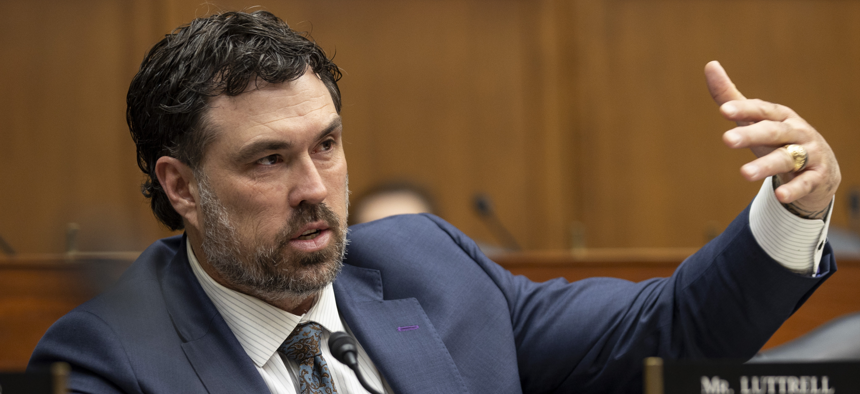
The bill, which is cosponsored Rep. Morgan Luttrell, R-Texas, would institute new training and performance standards within the VA's Board of Veterans' Appeals Anadolu / Getty Images
VA claims appeal board errors are the target of a new House bill
The Veterans Claims Quality Improvement Act seeks to mitigate errors made by the Board of Veterans’ Appeals with new training, performance evaluations and required reports to Congress.
New legislation introduced Wednesday seeks to bring more accountability to the Veterans Affairs Department’s office tasked with ultimately adjudicating benefits claims decisions.
The Veterans Claims Quality Improvement Act — cosponsored by Rep. Morgan Luttrell, R-Texas, — would require the VA’s Board of Veterans' Appeals to identify errors made in claims judgments, report them to Congress, conduct additional training and institute performance evaluations for board judges, among other provisions.
“Over the course of several hearings, I’ve heard time and again about the Veterans Affairs Board of Appeals failing to ensure quality decision-making on veterans’ claims,” said Luttrell, the chairman of the House Subcommittee on Disability Assistance and Memorial Affairs, in a statement. “The legislation I introduced this week would ensure that the Veterans Affairs Board of Appeals provides veterans and their families with legally accurate and fair decisions on their claims for VA benefits.”
The Board of Appeals handles the department’s final adjudication of veterans’ disability and other benefits claims. Further appeals can be made to the U.S. Court of Appeals for Veterans Claims after a Board of Appeals decision, but the wait for a decision can sometimes take years. The board’s website states it still has a backlog of over 200,000 pending appeals to be heard by Veterans Law Judges.
Luttrell’s bill follows a November 2023 subcommittee hearing where a Government Accountability Office official testified that the CAVC sent back about 80% of appealed board decisions by between fiscal 2020 and 2022. because “it found the board’s explanation of its findings to be inadequate,” and that its accuracy rate for error-free adjudications weren’t verifiable in two of the fiscal years examined due to a lack of data and analysis.
Further, the GAO found that following appeals reform made by the 2017 Veterans Appeals Improvement and Modernization Act that allowed veterans to, among other things, appeal directly to the board, that up to 2,220 AMA decisions may have been sent to veterans with one or more errors in them in fiscal 2022 — despite board claims of 91.9% accuracy rate that year.
Luttrell’s bill would require the board to report errors to Congress, to require training at both the board and the Veteran Benefits Administration to learn from errors made, that the VA Office of General Counsel further train VBA program offices on policy guidance revisions, that board judges face annual performance evaluations and that the board develop a strategy to reduce unnecessary case remands.
The bill — which was cosponsored by Reps. Elise Stefanik, R-N.Y., and Gus Bilirakis, R-Fla., has been referred to the House Committee on Veterans' Affairs.







